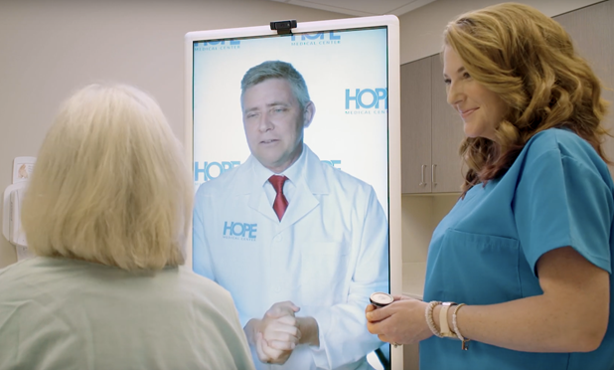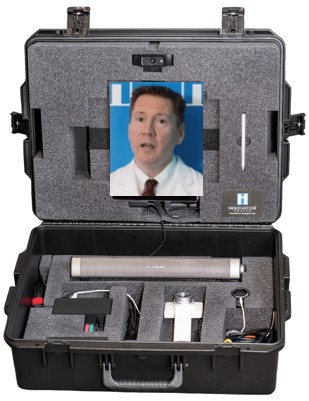Jonesboro-based telemedicine technology company Innovator Health (IH) has received a $900,000 contract through the Department of Defense Air Force Small Business Innovation Research program. This Phase II award will be used to build the SURVIVORSM, billed as the most lightweight and simple-to-operate telemedicine system ever developed.
Through SURVIVOR, the company will provide the military with an alternative treatment platform for healthcare. IH also intends to bring this technology to rural hospitals in the civilian market to provide broader services for local patients.
The Company
This veteran-owned company is led by two highly qualified executives, Dr. Darren Sommer and Dennis Kopp.

Dr. Sommer serves as the chief executive officer and chief medical officer. Sommer is an internal medicine physician who has been practicing as a hospitalist for 15 years. His start in telemedicine followed a deployment to Afghanistan in 2006.
In addition to his medical background, Sommer also holds a master’s degree in public health and an MBA from Duke’s Fuqua School of Business. Sommer, a 25-year military veteran, serves as a lieutenant colonel in the U.S. Army Reserves.
“When I returned home to North Carolina following a 2006 deployment in Afghanistan where I treated very sick patients in austere environments, I started working in rural areas of the state and saw a lot of the same challenges there that I’d seen in Afghanistan. As a physician, my concerns included both how to deliver healthcare services and how do I tell somebody they have cancer or that their mom has dementia when I’m talking them on a Skype or a Zoom-like system?” said Sommers.
From that point, Sommers’ focus in telemedicine was on creating a technology that would allow healthcare to be delivered in rural communities and using life-sized, 3-D systems that provide patients with direct eye contact.
Dennis Kopp serves as IH’s chief operations officer and chief commercial officer. Kopp has specialized knowledge in business development, innovation, manufacturing, product management, and supply chain.
He has 30 years of leadership roles at GE, Avery Dennison, Glatfelter, and Johns Mansville (Berkshire Hathaway), where he launched several new products and businesses.
Survivor Product Meets Military Needs
Evacuation
Today, the way the military treats patients overseas is to have local healthcare resources provide care on the battlefield. When they’ve reached the limits of their capability, patients are then transferred from a lower acuity of care to a higher acuity of care.
The transfer to higher acuity of care often involves sending patients to Germany and then to the U.S. This process can create bottlenecks for healthcare operations in Germany.
“The military can spend about $70,000 per flight to transport injured service members from combat zones back to the U.S. Having the capability to provide telemedicine services for patients in austere environments is extremely important to reduce costs, allow patients to heal in place, and safely return recovered servicemen to the battlefield,” said Sommer.
Complex Technology Options
“Most telemedicine technologies require large amounts of bandwidth (2-2.5 mbps) to operate both audio and video transmissions simultaneously and are usually very complicated to use. The military has very limited resources for such services. When you train a servicemember on how to use telemedicine systems today, it may take six months to one year before they actually use it. When they do, it’s likely a stressful situation for them to operate those systems. Having simple-to-operate technology that uses very little bandwidth increases the capability for the military all over the world,” said Kopp.
“One of unique things about our technology is that it uses very little bandwidth – 750kb of data per second. It will be able to operate systems on a 4G cellular network, unlike the competitors that would produce a highly pixelated or frozen screen that continually would lag behind the audio. It’s also very simple to operate, as all IH product lines typically just take one button to operate.
“The SURVIVOR is a ruggedized backpack and will require no training in advance of its operation. This will ensure it can be used anywhere in the world, by anyone, and at any time it is needed,” said Kopp.
All of IH’s technology is supported by a proprietary cloud-based software that the company is currently redesigning to meet the required level of security for operations on the DoD network.
Impersonal
Current telemedicine technologies are impersonal and ineffective at simulating an in-person physician-patient experience. It’s important for physicians to maintain meaningful bedside manner, including direct eye contact, when delivering difficult diagnoses and prognoses to their patients.
“Our technology allows physicians to be by patient’s bedside in their life-size form and greet patients with eye contact. IH provides physicians with a branded background, lighting, and professional microphones so that the experience that the patient is receiving is as real as if the physicians were there in the room,” said Sommer.

Civilian Market
“The SURVIVOR is not only going to benefit the military, it will also benefit right here in the U.S. supporting medical efforts in rural communities and during times of manmade and natural disasters,” said Kopp.

Lack of Access
Rural areas account for 80% of the landmass of the U.S., with fewer than 9% of all physicians practicing in these areas. The 10 million rural Americans who are over the age of 65 account for more than 150 million specialist visits each year. On average, patients in this demographic commute 42 miles each way to urban communities to receive needed healthcare services.
IH estimates over 1,800 rural hospitals across the U.S. could benefit from improved ways to broaden offerings for their local patients.
Innovator Health is presently providing telemedicine technology and services to 24 rural hospitals.
“We are partnering with St. Bernards Medical Center, the major regional medical center in northeastern Arkansas. St. Bernards telemedicine services supports several small and rural hospitals with physicians from Arkansas, North Carolina, and Florida. Our telemedicine product lines also come with advanced electronic medical devices including stethoscopes, otoscope, and other lens capability to conduct patient exams in conjunction with bedside nurses. Finally, we absolutely want our devices to be used and not stored in hospital closets like so many other technologies. We work closely with the admins, nurses, and physicians on training, reimbursements, policies, and even financial modeling all in hope of creating a sustainable telemedicine practice,” said Kopp.
Impact of COVID-19
“Since the COVID-19 pandemic began, there has been so much demand for telemedicine systems and technologies that can be stood up and operational quickly. Telemedicine has also allowed physicians to interact with patients who have COVID-19 or screen patients for COVID-19 without having to use PPE or expose themselves to illness,” said Sommer.
“As this disease spreads across the country and physicians are concerned about their ability to provide healthcare services because of their own healthcare issues, telemedicine really provides a nice platform for them to be able to provide healthcare services when they otherwise would not be able to do that.”
Engaging the Customer
Innovator Health is working with the Air Force Research Lab to develop SURVIVOR.
“Many of our Air Force stakeholders are interested customers. By giving them the opportunity to weigh in on design elements for the SURVIVOR, they are essentially customizing a solution to their specific needs. The Air Force team has been easy to connect with, the subject matter experts engaging, insightful, and very supportive of our efforts,” Kopp said.
Innovator Health has an opportunity to sell to other agencies such as the Federal Emergency Management Agency, Defense Health Agency, and Health and Human Services.
“A large number of entities are ready to start using this technology as soon as its developed. Our growth will skyrocket once this project is done,” said Sommer.
ASBTDC Assistance
Sommer and Kopp engaged the Arkansas Small Business and Technology Development Center for assistance in preparing their DoD Air Force SBIR Phase II application.
“The ASBTDC has been instrumental in assisting us with covering gaps in our knowledge base. There are so many elements to working with the military that can be frustrating. Having a knowledgeable partner like the ASBTDC made the process run much smoother. Additionally, they are very easy to work with and super accessible,” Sommer said.
Advice for Future Applicants
For those who are interested in submitting a SBIR proposal to the Air Force, Kopp advises, “Don’t be afraid to apply, fail, and keep trying. The process will take time, patience and faith that your effort will pay off and help our warfighters.”
What’s Next for Innovator Health?
“We are working to have the SURVIVOR completed ahead of schedule and under budget. Our plan is to move into a Phase III contract, gain FedRAMP approval and ATO for military use, and work on growing our government line of business,” said Sommer.